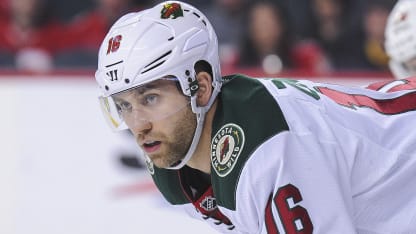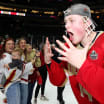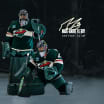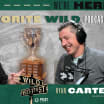LAS VEGAS -- Minnesota Wild forward Jason Zucker is as proud a Las Vegas native as you'll ever find.
Born in Newport Beach, California, Zucker moved to Las Vegas when he was less than a year old. Now 25, he's the only Nevada-raised player to reach the NHL.
But if you're planning on visiting and hoping to run into the speedy winger at one of the countless casinos or shows on the famed Las Vegas Strip, you're probably out of luck.
Son of the Sand: Zucker Talks Hockey in the Desert
Wild forward and Las Vegas native believes hockey can thrive in hometown

"I golfed at a course just down the road," Zucker said from his hometown last week. "I realized quickly why I never come here. It took me 15 minutes to get off the freeway and it took me 15 minutes to drive a mile past Las Vegas Boulevard. It's crazy down here."
If it's crazy now, just wait until this fall when the city's first professional sports franchise begins play. The NHL's 31st club, the Vegas Golden Knights, will embark on its inaugural campaign in October, playing its home games at the shiny T-Mobile Arena, just a slapshot away from Las Vegas Boulevard on the Strip's south end between the Monte Carlo and New York, New York casinos.
Walk into any of the packed-to-the-gills gift shops around town, and next to the snow globes, the shot glasses and the postcards, you'll find a variety of Golden Knights gear.
Hockey in the desert is an experience the NHL is still trying to perfect down the road in Glendale, Arizona, but if the early buzz about hockey in Vegas is any indication, the NHL might be onto something.
"I think they're already pretty excited about it," Zucker said. "Overall, it's going to come down to how the team does and how exciting it is to go. There's so much to do here, I think everything that goes on here has that certain level of excitement with it. So as long as they're exciting and fun to watch, and they're a good team, they're going to have a lot of fans."
Ultimately, if hockey in Vegas is going to succeed, folks in the community will not only have to support the Golden Knights, but also the sport at the grassroots level.
In neighboring California, hockey's popularity is at an all-time high. Spurred by the Los Angeles Kings' acquisition of Wayne Gretzky in 1988, its exposure increased tenfold overnight. A few years later, California began churning out talent that was reaching higher and higher levels of the game.
In 2007, the Anaheim Ducks won the state's first Stanley Cup. The Kings followed with two championships of their own a few years after that, cementing California as one of the United States' preeminent hockey hotbeds.
Now, the mission is to do the same in Nevada, and the hope is that the current energy surrounding the Golden Knights will help plant seeds that will one day have others from the Silver State joining Zucker in the NHL.
The Golden Knights will have a committed partner in that effort in the Nevada Amateur Hockey Association, which named Zucker's father, Scott, president last month.
"For him, he didn't feel that Vegas had enough people that had the best interest of hockey in mind," Zucker said. "So he decided he wanted to bring that part to it."
According to USA Hockey's 2016-17 registration report, Nevada has 539 registered hockey players aged 18 or under in the entire state. In California, that number is 13,031. While there is a significant difference in the state's populations, the disparity between the two numbers is disproportionately high.
Zucker said he hopes a determined effort from all parties involved can help close that gap in future years.
"What I think a lot of the [goal] is [should] be the curiosity of it," Zucker said. "They're trying to grow it, they're trying to get it bigger. It's decreased since I played here, but I think now, it'll start to pick back up.
"I think if it piques curiosity, it has a chance."
Growing pains
While cost is certainly a factor for many families when it comes to getting their kids involved in hockey, perhaps the biggest obstacle in Nevada is access.
While states with strong hockey histories like Minnesota have an abundance of "try hockey" programs that help outfit kids at affordable rates while instilling a desire to play the sport at a young age, simply finding equipment in Nevada can be a challenge.
Need a new stick or a new helmet in Minnesota? A trip to Total Hockey or any number of other shops provides players with plenty of viable options.
There aren't hockey-specific stores in Nevada and the local sporting goods chain likely has limited hockey inventory.
Sports like football, basketball, baseball and even golf have been much more popular in the area, because of things like cost and access.
"Those are all so big that it's hard to get people into hockey," Zucker said.
If hockey is to take off, Zucker said supporters of the sport would be wise to make affordable access to equipment a priority.
"For sure. I hope they do it that way," he said. "There is a system at the Las Vegas Ice Center right now called Hockey 1-2-3. But the only thing with that is you have to have your own gear. If you come to Hockey 1-2-3 ... it's free, as long as you have your own gear. But buying your own gear is expensive."
A day in the life
Zucker, his wife, Carly, and their daughter, Sophia, just got back from Minnesota earlier this month. He will train here for the next several weeks, returning to Minnesota intermittently for various charitable functions during that time.
Now recovered from the sports hernia surgery he had shortly after the season ended, Zucker is working out daily for a couple hours, usually between noon and 2 p.m.
With just three sheets of ice in the whole city, Zucker skates at a local rink not far from the Strip. Once home to three rinks and four sheets, Swenson Ice Arena -- where Zucker was introduced to ice hockey -- no longer exists.
The remaining rinks are all painted white to help reflect heat during the summer's scorching temperatures. All in all, ice conditions are usually pretty good.
"It's not going to be like Minnesota in the winter, but it's not bad," Zucker said.
Zucker's off-ice workouts have shifted in recent years. Whereas he worked with a trainer a few years ago that had him doing MMA-style workouts, Zucker now works with Red Road Training's Steve Chayra, a former Navy SEAL who has opened his eyes to some different kinds of workouts.
"The MMA stuff was great, but I don't feel it got me as strong on the ice," Zucker said. "It was really good for being in uncomfortable positions, being able to move around. But as far as pure strength, it wasn't exactly what I needed."
Among his new workouts include breathing techniques that work core muscles in addition to a weekly trip to the pool for swimming.
"It's a lot of breath work, doing breath holds under water," Zucker said. "He tells me every day, 'You have to get your body to deep water,' because that's the most uncomfortable thing in the world is being in deep water. He feels that everything we do in the summer, if he gets me to that point, the hockey season is easy, just when it comes to things in games and the way your body can handle it."
Future considerations
Zucker got a boost of confidence when the Wild included him on its protected list for the expansion draft.
With seven forward spots available, and three of them occupied by players with no movement clauses in their contracts, Zucker was one of a handful of other players jockeying for a coveted protected slot.
While the Golden Knights certainly would have loved an opportunity to bring him home, Zucker said his heart is in Minnesota and he wants to be there for the long haul. The feelings were apparently mutual, as the Wild included him on its list, along with Mikael Granlund, Nino Niederreiter and his best friend Charlie Coyle, along with vets Zach Parise, Mikko Koivu and Jason Pominville.
"That was huge. That was awesome," Zucker said. "I wasn't given an indication [before the list was released], so that was a bit nerve-wracking, not knowing. We have so many guys that could have been protected, they could have easily gone with [eight skaters and one goaltender], could easily have chosen a different forward with [Eric Staal] or [Erik Haula]. We have so many guys that are great players, so it was a relief."
Like Granlund, who went into the 2016-17 season in a contract year, Zucker enters the upcoming season looking to build on what he and the team were able to accomplish.
Granlund had a career year, leading the Wild with 69 points -- a season that is likely to lead to a lucrative long-term contract with the team this summer.
Zucker hopes to make a jump in 2017-18 like Granlund did a year ago, helping to secure his future in Minnesota and help the team take another step after a disappointing end to the season.
"It's huge. I think it's the biggest year that I've had to date," Zucker said. "Last year was big, coming off a down year for me the year before. But I think being able to prove that I can follow up and be better is a harder task and a bigger task. I'm excited for it. I know I'll be more ready.
"In my eyes, I'm expecting a lot more this year than I ever have."


















